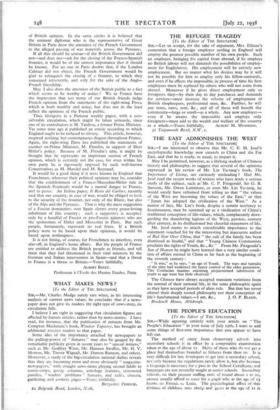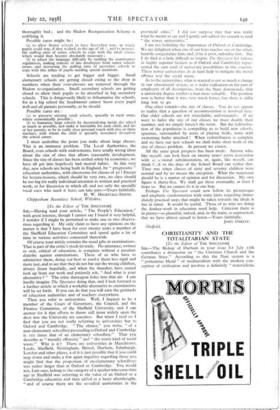THE PEOPLE'S EDUCATION
[To the Editor of THE SPECTATOR] SIR,—While agreeing entirely with your article on " The People's Education " in your issue of July 15th, I want to add some things of first-rate importance that you appear to have left out.
The method of entry from elementary schools into secondary schools is in effect by a competitive examination taken at the age of about 11. Many of those who do not get a place feel themselves branded as failures from then on. It is very difficult for late developers to get into a secondary school, not only because the regulations rarely allow it, but also because a language is necessary for a pass in the School Certificate, and languages are not normally taught at senior schools. Secondary schools, on their present staffing ratio of round about I to 20, cannot usually afford to cater for a pupil who at the age of 53 knows no French °L. Latin. The psychological effect of this' division of children into sheep and goats at the age of II is
thoroughly bad ; and the Hadow Reorganisation Scheme is codifying it.
Possible cures might be :
(a) to allow Senior schools to have Secondary tops, in which pupils could stay, if they wished, to the age of a ±, and to increasa the staffing ratio of senior schools to cope with the small classes which would then become absolutely necessary ;
(b) to adjust the language difficulty by tackling the examination regulations, making transfer of late developers from senior schools easier, and increasing the staffing ratio of secondary schools to cope with this influx of pupils needing special treatment.
Schools are tending to get bigger and bigger. Small elementary schools are getting closed owing to the drop in numbers when their over-elevens are removed through the Hadow re-organisation. Small secondary schools are getting closed to allow their pupils to be absorbed in big secondary schools. This is dangerously likely to dehumanise the schools, for in a big school the headmaster cannot know every pupil . well and all parents personally, as he should.
Possible cures are : (a) to preserve existing small schools, specially in rural areas, where economically possible ;
(6) to humanise large schools by decentralising inside the school as much as possible, and make it inevitable for each child, and his or her parents, to be in really close personal touch with two or three teachers, with whom the child is specially associated throughout the school career.
I must underline the point you make about large classes.
This is an immense problem. The Loral Authorities, the Board, even schools with endowments, have totally wrong ideas about the size of class that allows reasonable development. Since the size of classes has been settled solely by economics, we have all got into hopelessly bad mental habits. At this very day, new schools are being built in England, by " progressive " education authorities, with classrooms for classes of 5o ! Except for lecture-lessons, which should be very rare, no class should be too big for really individual attention to written and practical work, or for discussion in which all, and not only the specially vocal ones who need it least, can take part.—Yours faithfully,
H. W. HECKSTALL-SMITH.
Chippenham Secondary School, Wiltshire.












































 Previous page
Previous page